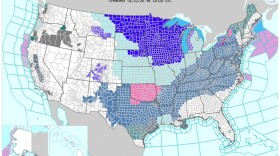State health officials reported 2,883 new cases of COVID-19, Wednesday, bringing the statewide total to 741,632 cases. The Florida Department of Health also reported 64 new coronavirus-related deaths, Oct. 14, increasing the statewide death toll to 15,788 fatalities.
Of the 5,622,438 COVID-19 tests that have been reported in Florida so far, the overall positivity rate remains at 13.19% and the latest single-day positivity rate increased to 5.39%.
In the Southwest Florida region including Charlotte, Collier, Glades, Hendry, Lee, Manatee and Sarasota Counties, health officials reported 403 new COVID-19 cases, Wednesday, for a total of 62,102 cases.
There were also six new coronavirus-related deaths reported in the Southwest Florida region Oct. 14, including three deaths in Manatee County and one fatality each in Charlotte, Lee and Sarasota Counties for a total of 1,524 deaths since the start of the pandemic.
An analysis by NPR finds most states don't have enough contact tracers to follow up on coronavirus cases and Florida is among states that are falling short.
The estimated need of people doing contact tracing is based on two weeks of coronavirus cases in each state. According to NPR's latest survey, Florida would need just over 8,700 contact tracers to control the outbreak. Florida currently has just over half that number.
Contact tracing is a classic public health process. It involves notifying people who've tested positive for COVID-19 as well as their close contacts.
The goal is to prevent the spread of the virus, which could help keep local economies open.
A national COVID-19 “dashboard” released Wednesday by AARP shows that the death rate of Florida nursing home residents over a recent four-week period exceeded the national average.
The AARP online site, which looks at nursing home data for four weeks ending Sept. 20, shows that 1.38 of every 200 nursing home residents in Florida died from COVID-19. Nationally, about one out of every 200 nursing home residents died from COVID-19.
Also, the rate of infected nursing home residents in Florida was 4.5%, compared to 2.6% nationally. Moreover, the rate of infected staff members in Florida nursing homes was 3.9 per 100 residents, exceeding the national average of 2.5 per 100 residents.
AARP Florida spokesman Dave Bruns said Florida is the “grayest” state in the nation. One in five residents is age 65 or older, or 20.4 percent of the population, compared to 13.4 percent nationally.
“If there is any place that should be focusing on this, it should be the Sunshine State.” Bruns told The News Service of Florida.
The AARP dashboard has national and state information and is based on data the nursing home industry reported to the federal Centers for Medicare & Medicaid Services for the four-week period between Aug. 24 and Sept. 20. That period included a Sept. 1 move by Florida to allow visitation to resume at nursing homes, after months of the facilities being locked down to prevent the spread of COVID-19.
The information compiled by AARP underscores continued work that needs to be done, Bruns said. Among other things, AARP Florida has said regular, rapid-result testing of staff members, residents, visitors and vendors should be mandatory at all elder-care facilities to prevent the spread of the virus.
“People are picking this virus up in restaurants, in bars, in social settings, at sporting events and other places. Then, the fear is that they will carry it into these facilities,” Bruns said. “Once it gets into these facilities, it is not uncommon for a quarter, sometimes even as much as half, of the people who are infected to die.”
Gov. Ron DeSantis’ office did not comment on the AARP information, but DeSantis has touted the state’s efforts to keep residents safe at Florida’s 694 nursing homes.
The administration, though, in the last month has reversed policies such as mandatory testing of all long-term care staff members and the use of specific facilities that cared for and isolated nursing home residents with COVID-19.
The DeSantis administration also lifted the ban on visitors at long-term care facilities last month. While he acknowledged the move would increase COVID-19 cases, DeSantis said the need for visitation could no longer be ignored.
As of Wednesday, 6,136 long-term care residents were positive for COVID-19, according to state data. That figure includes residents of nursing homes, assisted living facilities and intermediate care facilities for people with developmental disabilities. Also, more than 6,300 residents and staff members of long-term care facilities have died from COVID-19. The overwhelming majority of those deaths involved residents, data show.
The AARP dashboard shows that Florida had a higher percentage of nursing homes with active cases of COVID-19 positive residents, 47%, than the national rate of 24 percent. And nearly 72% of Florida nursing homes reported COVID-19 infections among staff, compared to about 48% nationwide
In a statement to the News Service, Florida Health Care Association spokeswoman Kristen Knapp said, “More can always be done to improve our state’s long-term services and supports system for our seniors and individuals with disabilities.”
Knapp said the association, which represents nursing homes throughout the state, looks forward to working with AARP, among others, on “continued support to ensure the safety, care and well-being of our nursing home residents, their families and caregivers.”
Knapp also said that “99% of nursing home residents are COVID free and 98% of staff are COVID free.” She said that is based on state Department of Health information that excludes from consideration the numbers of positive nursing-home residents transferred out of facilities
In addition to increased testing to curb the spread of the virus, AARP has advocated for greater transparency of the public reporting of cases and deaths in facilities and called for increased accountability of how nursing homes spend state and federal Medicaid and Medicare dollars and CARES Act stimulus funding.
The AARP information showed that Florida nursing homes fared better than the national average when it came to personal protective equipment. Nationally, 28% of nursing homes reported having less than a week’s worth of so-called PPE on hand during the four-week period. In Florida, 20% of the facilities reported having less than a week’s worth of protective gear.
Florida nursing schools are scrambling to recruit more nursing students. The Florida Center for Nursing predicts that the state could need for more than 100,000 nurses by 2023.
Dean of the Nicole Wertheim College of Nursing & Health Sciences at Florida International University Dr. Ora Strickland said the pandemic has added a new challenge for nursing students to finish their education.
“As long as we're having to deal with this pandemic, the need for nurses is going to be high,” said Strickland.
“Of course, with students not being able to go in and do their clinicals on sight as readily as they could then we're concerned that our pipeline into nursing may slow down.”
The clinicals Dr. Strickland is talking about involve the time students spend in actual hospitals getting hands on experience with real patience.
Parents of students in Collier County schools who want to switch their child's learning model for the next quarter have until midnight Friday to do so.
The Naples Daily News reports, the district sent out a survey this week to parents with kids enrolled in the Classroom Connect and High School Flexible learning models, allowing them to switch to in-person classroom learning or keep them in a virtual model.
35% of Collier students are enrolled in the Classroom Connect learning model making it the most popular option currently.
The Collier School District's safety guidelines and mask mandate due to the coronavirus will continue into the next quarter for students and staff while on campus.
WGCU is your trusted source for news and information in Southwest Florida. We are a nonprofit public service, and your support is more critical than ever. Keep public media strong and donate now. Thank you.









